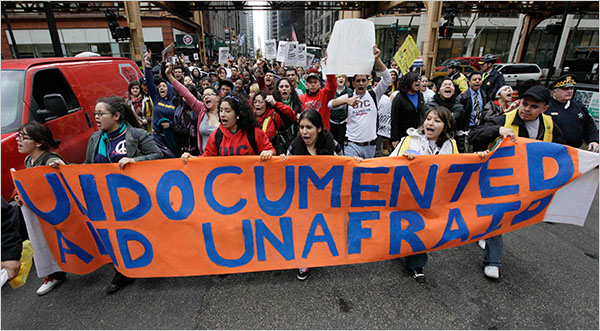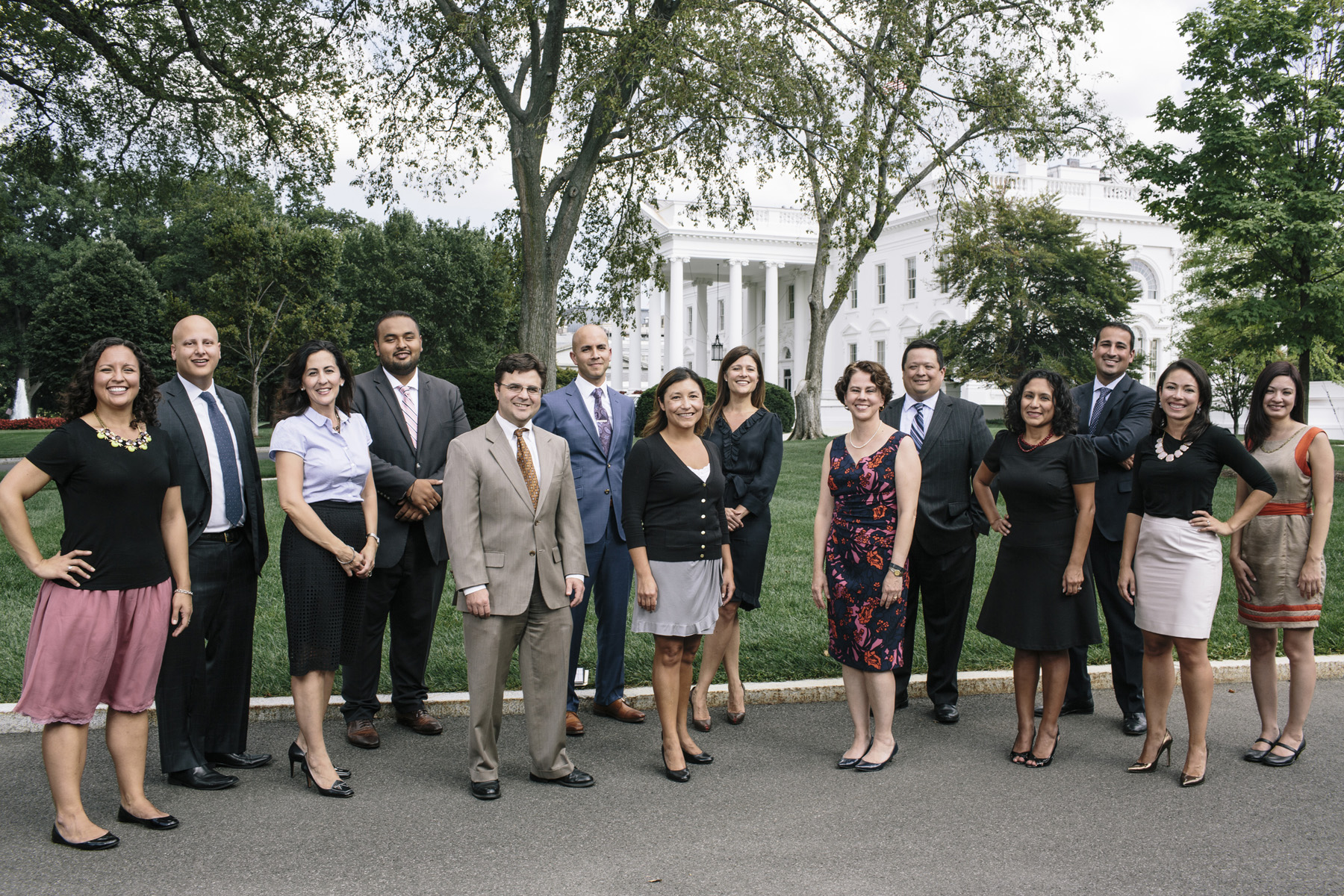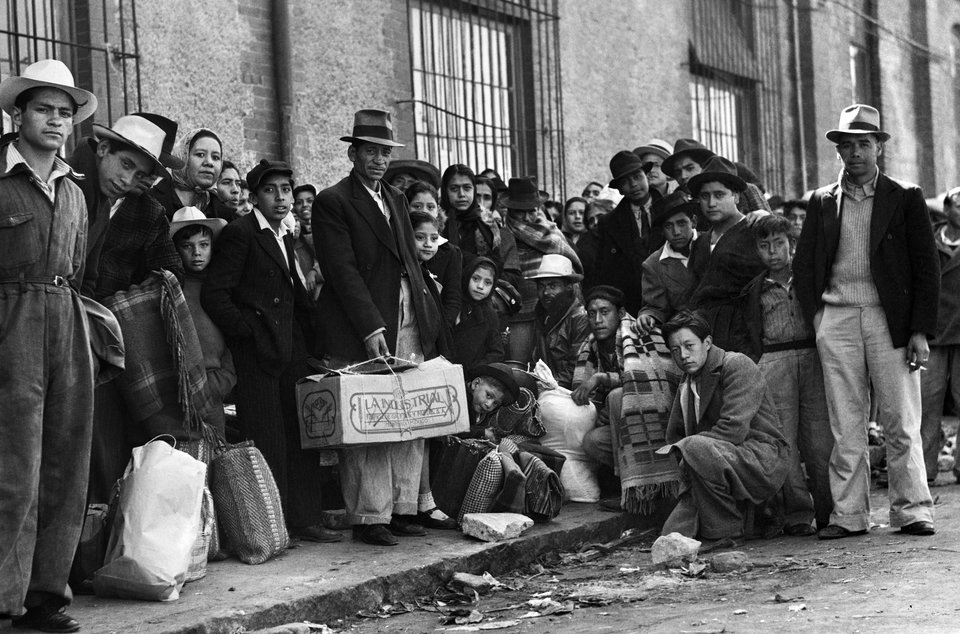|
SOC 335 FALL 2015  
  |
|
SOC 335 FALL 2015  
  |
This course explores the rich and diverse historical and sociological - class, gender, ethnic, and migrant - experiences of the Latino peoples in the United States around three historical eras covered in the three books assigned, plus in extra course materials placed on Blackboard. The first era corresponds to the beginning of large-scale Mexican worker migration and settlement in California's agricultural regions, which occurred in the first four decades of the 20th century, just before the Second World War (the Guerin-Gonzales book). This experience includes the imfamous "Repatriation Campaign" of the 1930s during the Great Depression.
The second era, from the 1940s to the
1980s, is marked by the
social and geographic marginalization of Mexican American communities
in the U.S. Southwest, their coerced assimilation and discrimination
experiences, which
sparked first a civil rights movement, the farmworker movement, the
first Latino political campaigns, and then an ethnic rebellion in the
late 1960s and early 1970s - the Chicano Movement -,
all in tension with the growing guest-worker (bracero) and undocumented migrant flows from Mexico (the Gutierrez book).
The third experience we study is the
post-1965 dramatic rise in Mexican and other Latin American immigration to the U.S., both regular and
undocumented, all the way to the present, combined with the contested establishment of the multicultual society model, which has led to the multifaceted, uneven and
incomplete, ongoing integration of U.S.-born Latinos into the
mainstream of American economic, political, and social life (the Garcia
book).
COURSE STRUCTURE
The course will be run in a format combining lectures by Dr. Santos and student presentations. Students will form sixteen groups ("grupos") of up-to-three students
each, and, after the first week of class, will take turns introducing
and analyzing the assigned readings for each session, followed by the lecture & class
discussion. Every student group
will present once to the class during the quarter. Presenting students must meet beforehand and divide up the readings among themselves. Some days we may also have a video documentary presentation.
Attendance is absolutely mandatory (please, no tardiness or early
departures, as
these too will be penalized). ALL students must come prepared to
discuss
the assigned readings for each class session - a policy that will be
implemented by having every student not presenting on a given day bring a reading assessment for each of the readings assigned.
The reading assessments must be turned in to Dr. Santos at the
beginning of each class session. (No late submissions will be accepted.)
Besides the grupo class presentations and the
reading
assessments turned in at every class (except when presenting), the students will collaborate within their grupo on one
research project, consisting of individual research papers
around a selected grupo topic related to the Latino experience in the
United States.
Class
Presentations: At the
beginning of the course, the students will be self-organized in 16
groups of up to three students each. Each group will be designated by a number. On
the date identified in the schedule
below, groups
will make their individual PowerPoint class presentations. Class discussion & Dr. Santos's lecture will
follow the presentations.
Please
upload your presentation in the course's Blackboard account prior to
giving it or immediately afterwards, for
purposes of eventual grading. Time allotted per individual presentation
is up to 10 minutes. Each presenting student will introduce,
describe, highlight, and summarize his/her own portion of an assigned
reading, and on the last slide raise one pertinent, interesting
question for subsequent
discussion. Each student should insert appropriate quotes, charts, and
figures from the
portion of the textbook he/she is covering, or from extra sources, apart from
his/her own text. Please avoid cluttered slides full of tiny font
text -- instead, make more slides with less text each --; or busy, messy backgrounds that render the
text
unreadable - please choose clean formats. Images are welcome, as long as they
are relevant, informative,
and will be explained by the presenter (especially charts). If
you put up a picture or graph, be prepared to refer to it and answer detailed questions
about it!
As a precaution, please bring your
presentation in a
USB-type memory stick and also email it to your own email
account. IMPORTANT: When it's your turn to present, please show up EARLY to
set up & test your individual presentation.
Each individual presentation will be graded based on: (a) the analytical strength
of the presentation (how well it was
organized, the topics selected, and how well these were covered), (b) critical thinking displayed, the quality and relevance of all visuals and materials
added;
(c) the relevance and quality of the
question posed
at the end, and (d) the
quality
& style of the oral delivery
(your communication skills). NOTE: Points will be take off for poor
group coordination and presentations' overlap or repetitiveness.
Reading Assessments: To ensure that everybody come to every
class prepared to discuss the assigned readings, students who are not
presenting must bring to class one written "reading assessment"
per
chapter assigned, each one-to-two pages in length,
double-spaced,
one-inch margins, font 12 text. Dr. Santos may randomly select a couple
of students to read their assessments and/or questions in the
discussion period. PLEASE DO NOT SEND YOUR READING ASSESSMENTS BY EMAIL, as they
will not be accepted and will simply be deleted. NOTE: No late reading assessments will be
accepted, unless the student has a pre-authorized absence from Dr.
Santos.
CONTENT: Please always write on top of your
reading assessments, single spaced, your name, the date, and the title
of the chapter/book
you are
assessing. In contrast to the presentations, these
"reading assessments" must not
summarize or describe the readings, but must critically respond to a few relevant aspects you choose; express what you think about them; identify the
areas of strong agreement &
disagreement with the author, or surprise, or even confusion. Whatever you choose to
write, you
should explain yourself. The reading assessment, being one page long, cannot and should not cover every issue found in the assigned
readings for the day; you must be selective
and demonstrate judgment
in the choices of topics you made (by the way, "front-page topics"
are always
suspect!). A very bad
assessment will reveal the student read very
little or very superficially just to do the assignment (it's called
"just going through the motion"). A good
assessment will demonstrate the
student really read the material and did a serious effort to select and
critically grapple with some of the main issues raised. At the end of
each reading assessment, students should always write an intelligent
question that demonstrates you read well, for class discussion.
IMPORTANT:
Students
presenting on a given day do not
need to submit ANY reading assessments FOR THAT DAY.
Research Paper: Students
in each grupo will
also be asked to
chose a
pertinent sociological topic related to the varied Latino
experiences in the United States, and design, organize, and carry out a
written group
research project on it, yielding up to three individual research papers
on complementary sub-topics. Group topics can range widely in historic
periods,
ethnic groups; may be Latino-wide or regional; it may be primarily
economic, social, political, or
sociocultural; or look at specific intertwined issues in the Latino
experience, such as immigration, social movements, wars, women's
condition, work,
family, education, religion, government, language, media, sports,
health, youth, aging, etc.. The students
must obtain approval
from
Dr. Santos
for their overall grupo topic, and then work out with him each of
their
individual
subtopics.
Grupo
delegates may visit Dr. Santos during his office hours
posted above.
Extra Points: Perfect attendance (allowing for up to two excused absences) will be rewarded with five extra points. Another way to get extra credit is to attend those campus or public events Dr. Santos announces in class, if you write a one page follow-up assessment report on each of them. A third way to earn extra credit is this: there are two general studies courses that students are strongly encouraged to take if they wish to develop their research skills, and if they do (either or both) they will receive extra credit: [For further information contact librarian Christy Gavin (email: <cgavin@csub.edu>, phone: 661-664-3237)].
Plagiarism: To prevent students from wittingly or
unwittingly engaging in plagiarism, Dr. Santos strongly recommends
students to carefully read and abide by the document CSUB
Classifications of Plagiarism found at: http://www.csub.edu/tlc/options/resources/turn_it_in_help_page.shtml Anyone found guilty of engaging in
plagiarism will
automatically fail the course and be reported to the Office of Student
Discipline and Judicial Affairs for further disciplinary action.
Grading: The individual class presentation is worth 20 points. The research paper is worth 35 points, individually assigned. The reading assessments are worth as a whole the remaining 45 points. The extra credit students may receive for taking the suggested General Studies courses will depend on their final grade in those courses, and may range from zero to 4 points (up to 2 extra points per course). Also there may be a point added for each outside event attended & reported on. Finally, perfect attendance will also be rewarded with 5 extra points. NOTE: every un-excused absence and tardiness/leaving early will be penalized with one point off per instance. The final letter grade will be assigned, on a scale of 0 to 100, as follows:
| 94-100 = A | 87-89 = B+ | 77-79 = C+ | 65-69 = D |
| 90-93 = A- | 84-86 = B | 74-76 = C | < 65 = F |
| 80-83 = B- | 70-73 = C- |
Office Hours & E-Mail to Dr. Santos & Ms. Vargas
All students are encouraged to visit Dr. Santos and Ms. Yesenia Vargas regularly during their respective posted office hours to plan for, or go over, their presentations; to get approval for their grupo research project topic, their own individual paper topic, and make sure their individual research papers are well organized, focused; or to discuss any question from the class lectures, the textbooks, or their grupo class presentations.
Dr. Santos and Ms. Vargas much prefers students to come to their
office
during their office hours, or to call them by phone at those times, rather than to
receive
e-mail
messages
that require more than a very short one-line reply. When you send an email to Dr. santos, expect a one-line answer.
Schedule of Reading Assignments & Grupo Presentations
| Week | Monday |
Wednesday |
| 1 |
Sept. 14 Introduction to the Course |
Sept. 16
Dr. Santos Lecture How Latinos became historically incorporated into the United States |
| 2 |
Sept. 21 Dr. Santos Lecture Current Characteristics of Latinos in the U.S. |
Sept. 23
Grupo 1 Mexican Workers And American Dreams Introduction & Chapter 1 |
| 3 |
Sept. 28
Grupo 2 Mexican Workers And American Dreams Chapter 2 |
Sept. 30 Grupo 3 Mexican Workers And American Dreams Chapter 3 |
| 4 |
Oct. 5 Grupo 4 Mexican Workers And American Dreams Chapter 4 |
Oct. 7 Grupo 5 Mexican Workers And American Dreams Chapter 5 & 6 |
| 5 |
Oct. 12
Grupo 6 Walls and Mirrors Introduction & Chapter 1 |
Oct. 14
Grupo 7 Walls and Mirrors Chapter 2 & 3 |
| 6 |
Oct. 19
Grupo 8 Walls and Mirrors Chapter 4 |
Oct. 21
Grupo 9 Walls and Mirrors Chapter 5 |
| 7 |
Oct. 26
Grupo 10 Walls and Mirrors Chapter 6 & Epilogue |
Oct. 28
Grupo 11 Latino Politics in America Chapters 1 & 2 |
| 8 |
Nov. 2 Grupo 12 Latino Politics in America Chapters 3 & 4 |
Nov. 4 Grupo 13 Latino Politics in America Chapters 5 & 6 |
| 9 |
Nov. 9 Grupo 14 Latino Politics in America Chapters 7 & 8 |
Nov. 11 No Class - Holiday |
| 10 |
Nov. 16 Grupo 15 Latino Politics in America Chapters 9 & 10 |
Nov. 18 Grupo 16 Latino Politics in America Chapters 11 & 12 |
| The Research Papers are due
by noon, Monday, November 23, in Word, uploaded to Blackboard |
My GRUPO
# is: _____
We
present on this date:
________
My Own Research
Subtopic (Paper Title) is:__________________________________________________________
My GRUPO
members are:
___Name________________________Phone_____________________Email_________________________________
1._______________________________________________________________________________________________
2._______________________________________________________________________________________________
3._______________________________________________________________________________________________